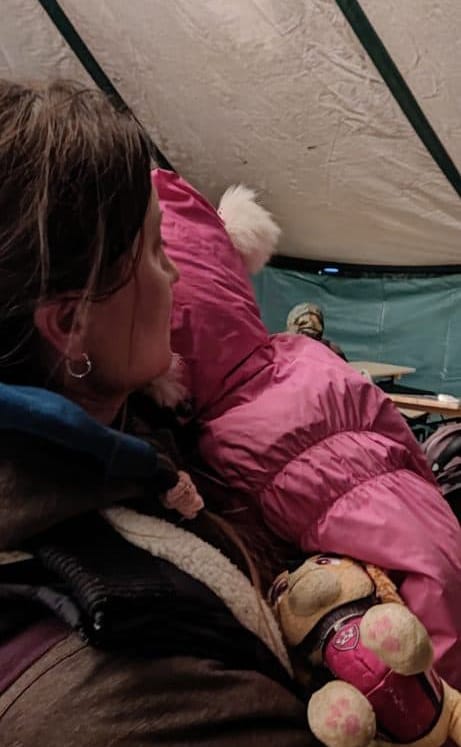
Daniel is a member of ADRA’s emergency support staff, serving at one of the centers welcoming refugees forced to flee the conflict in Ukraine. Thousands of displaced people, mostly women and children, have come across the border where he is, and he shared the story from one. The following are his words.
Inside ADRA’s Tent
It is around 7:00 PM when I arrive at ADRA’s tent center where Ukrainian refugees are able to rest for a little while, while they wait for transport to their next destination.
It’s already dark outside and the two heaters for the space stopped working 20 minutes ago. The 50 people we are hosting inside the tent, most of whom are women, children, and elderly, will need the heat with -3° C (27° F) temperatures outside. Michael, one of our dedicated volunteers on duty, uses his usual ingenuity to get the heaters going again.
It’s not long before the lights start flickering.
With many organizations set up at the border, the power supply struggles to keep up with all the electrical equipment we each use to keep our displaced guests comfortable. Firefighters have come to help set up backup systems, but the lights still flicker for several minutes before stabilizing again.
In the midst of everything, I notice one woman who seems oblivious to the flickering lights, the busy volunteers, and the other distractions of our busy center.
She is completely focused on keeping her two small children calm.
Like most who enter our tent, the woman is clearly exhausted, but her face does not express much emotion. She seems numb as she keeps her total focus on helping her children survive the latest stage of what is undoubtedly a long and overwhelming journey for the small family.
I sat across from her and started talking to her, asking her our usual, gentle questions. Where have you come from? Where are you going? Do you have someone coming for you?
She began to open up and told me her story.
Masha’s Story
Before the conflict began, Masha, whose name has been changed to protect her identity, lived in a city that has been hit hard by the conflict in Ukraine. Her husband ran a small business and she worked in the corporate sector before she took leave to be with her little ones.
The start of the conflict took Masha by surprise, something we keep hearing from those who arrive in our center, but she hoped it would end quickly and chose to stay at home with her family at first. But as the warning sirens got louder and the bombs fell closer to their home, she realized they had to leave.
In the time it took to organize herself and her young children, it was too late. It was no longer safe to leave their home until a temporary “green corridor” opened, offering safe passage to those who needed to evacuate. The soldiers in Masha’s neighborhood let the mother and children peacefully pass, one even telling her that he had family in Ukraine and wasn’t happy about being there.
Masha and her kids set out on their journey on foot.
The “green corridor” route they followed eventually crossed a place where two areas of the conflict meet, with a bridge partially destroyed by the relentless bombing.
The middle of the bridge was almost completely gone, so the only way to cross was to climb underneath, bypass the chasm, and climb back up to finish. The crossing was usually dry, but a damaged dam left the area flooded with water.
As Masha began the careful crossing with her little ones, she saw three military helicopters flying in their direction. She quickly picked up her children and carried them into the chasm and directly into the water.
Then, her worst nightmare came to life and the helicopters began firing on and around the bridge.
The water was cold, and no ground met her feet underneath, only jagged pieces of the broken bridge and metal beams covered in mud. Despite her fear, she told me that she just pressed forward, holding her children as tight as she could.
When they finally made it across, she had to use all her strength to climb out of the water and up the bank with her children. The helicopters appeared to be leaving the area, but others in the distance were screaming “Run! Run!” because they knew the helicopters could return. Once she reached this group, she was in safe territory.
She was alive. Her children were safe.
She described this stage of her journey, fighting for her and her children’s lives, as the most horrifying experience she could ever go through.
From there, Masha managed to find space on a train leaving the area. When she looked into the night sky while they traveled, she didn’t feel peace. Instead, she felt fear that bombs would fall on the train taking them to safety.
From the train, she crossed the border on foot and left her home country behind.
And now she was here.
Masha is now without her husband. Like most men in Ukraine, he couldn’t leave but has found safety in another part of the country. Instead, the self-sufficient mother is fully dependent on strangers and probably feeling more vulnerable than she’s used to feeling.
After hearing her story, the devastation her children were carrying had also become obvious—one finally collapsed into sleep, twisted in an uncomfortable position, out of sheer exhaustion.
ADRA’s welcoming space on the border is just one step on Masha’s journey. A contact from the nearby community was coming to take her and her children somewhere they could sleep, and she could regroup for whatever comes next. The struggling heaters and flickering lights don’t seem like enough for people who have been through as much as Masha has, but I am glad we were here for her tonight.